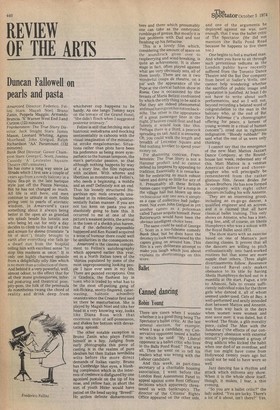Duncan Fallowell on pearls and pasta
Amarcord Director: Federico. Fellini Stars: Magali Noel, Bruno Zanin, Puppela Maggio, Armando Brancia. 'X' Warner West End 3 and Curzon (123 minutes) Frankenstein: The True Story Director: Jack Smight Stars: James Mason, Leonard Whiting, Agnes Moorhead; John Gielgud, Ralph Richardson "AA' Paramount (132 minutes)
Bank Shot Director: Gower Champion Stars: George C. Scott, Joanna Cassidy 'A' Leicester Square Theatre (83';2 minutes).
He has come a long way since La Strada which I first saw a couple of years ago from a rowdy balcony in a bijou flea-pit in the late baroque style just off the Piazza Navona. But he has not changed so much. All life is still here, old men continue to urinate in corn fields giving vent to pearls of atavistic wisdom, in Amarcord's case something about it always being better in the open air as grandad lets splash beside his lunatic son who being let out for only a day decides to climb to the top of a tree and scream for donna (translate "a bit of skirt"), finally brought to earth after everything else fails by a dwarf nun from the hospital telling him with excellent sense "to stop this madness at once." It is only one highly charmed episode from a delightfully silly film which is no more than a collection of them. And behind it a very powerful, well, almost odour, to the effect that for all their inane grotesqueries, infernal posturing and theatrical pornpity-porn, the folk of the peninsula do nonetheless twang the chord of reality and drink deep from
whichever cup happens to be handy. As one tango Tommy says on the terrace of the Grand Hotel, "She didn't flinch when I suggested posterior intimacy," Fellini is still that fetching mix of histrionic melodrama and mocking sentimentality in cahoots with the visual imagination of the miniaturist stroke megalomaniac. Situations rather than plots have been his preference as being more sympathetic to the human lampoon, the man's particular passion, so that although nothing happens by way of a story line, the film ruptures with incident. With whores and libertines as monstrous as Fellini's, who needs a beginning, a middle and an end? Definitely not an end. Thus his loosely structured Hogarthian epic reels onwards unabashed in its relentlessly, quintessentially Italian manner. If you are not too keen on pasta you are absolutely going to hate this. It occurred to me at one of the picture's weakest points, the arrival in the town of a sheikh plus harem, that if the definitely impossible happened and Ken Russell acquired a sense of humour there could well be similarities in the consequences.
Amarcorcl is the cinema complement to Fellini's autobiography which appeared earlier this year, set in a North Italian town of the 'thirties populated by some of the most unprepossessing looking people I have ever seen in my life. There are pointed exceptions. One is Gradisca, the flashiest lay in town who is trailed by what has to be the most off-putting gang of ink-flicking, snotty-fingered, caterwauling, halitotic schoolboy onanists since the Creator first said let there be masturbation. She is played by Magali Noel and tilts her head in a very knowing way, looks like Diana Ross with that enormous smile of self-possession, and shakes her bottom with devastating aplomb.
The other notable exception is Bruno Zanin who plays Fellini himself as a boy. Judging from early photographs this piece of casting is in the realms of pure idealism but then Italian terribilita wilts before the more direct demands of Italian vanity. Bruno has Cambridge blue eyes, a blushing complexion which in the interests of credence is disfigured by one agonised pustule on the tip of his nose, and yellow hair, in short the sort of youth Hitler would have patted on the head saying "Breed!" He strikes definite disharmonies
here and there which presumably one can take as the embryonic rumblings of genius. But mostly it is Just problems with Dad and not finishing up his fettucine. This is a lovely film which, considering the amount of space on the soundtrack given over to raspberrying and wind-breaking, is quite an achievement. It is sheer stage in fact, often played against what are very obviously sets, all of them lovely. There are on it two wonderful coups de theatre, on a par with the appearance of the Pope at the clerical fashion show in Roma. One is occasioned by the breasts of Maria Belizzi confronted by which the only thing to be said is that they are indeed phenomenal andmusthavegiven herrotten backache. The other is the appearance of a great passenger liner in the night. If heaven could float and had funnels it would look like this. Perhaps there is a third, a peacock spreading its tail. And it is snowing. Oh, you could walk the length and breadth of Leicester Square and find nothing lovelier to spend your money on. For shattering contrast, Frankenstein: The True Story is not a Hammer product and so cannot defend its limpness by appealing to tradition. Essentially it is remarkable for embracing so much robust talent and doing so little for any of it. Presumably all . these British names came together for a romp in the village hall but blown up into technicolour size one sees it simply as a case of .collective bad judgement. Not even John Gielgud in yet another cameo as a policeman called Turner acquits himself. Peter Butterworth would have been the obvious intelligent choice here.
The same could be said of George C. Scott in a too-fulsome comedy Bank Shot, but he does have the decency to look embarrassed by the capers going on around .him. This film is a very deliberate attempt to make you laugh which just about explains its shortcomings on this score.
































 Previous page
Previous page